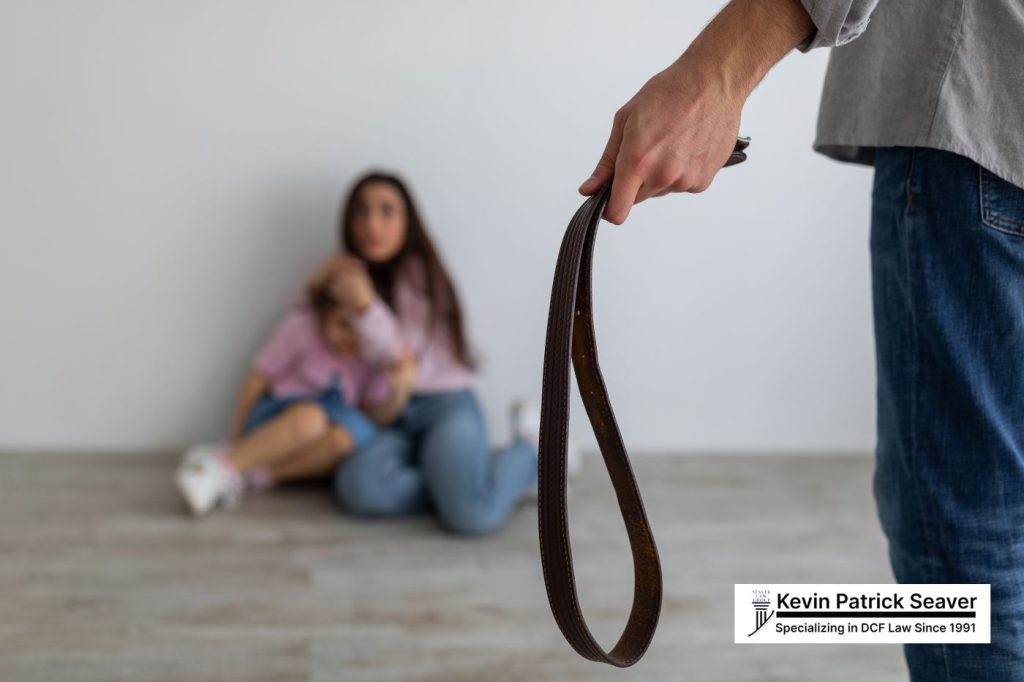Addressing Abuse: Defending Your Rights in DCF Domestic Violence Investigations
When Jenna and Owen received a knock on the door from a Massachusetts Department of Children and Families (MA DCF) social worker, their world turned upside down. The night before, they had their first major argument. They had been disagreeing about which religion their daughter, April, should pursue. Their argument had occurred while the couple was cleaning the home. So they were yelling across the house and making loud noises as they moved furniture. All the while, April was out at a friend’s house.
Their neighbor, on the other hand, did not know this. They only heard Jenna and Owen screaming back and forth to each other for what seemed like almost an hour. The neighbor, reminded of what arguments in their household sounded like as a kid, filed an allegation against Jenna and Owen with MA DCF.
Suddenly, MA DCF was questioning their ability to care for their children despite no history of harm in their home and no evidence that the child was even home. The stress of dealing with MA DCF’s domestic violence investigation felt endless, with each step making them feel more helpless as they faced accusations that seemed to escalate by the day.
At first, Jenna and Owen felt they had nothing to hide and admitted to having an argument. They did not realize that MA DCF would take their admission as substantial evidence that abuse may have been occurring. When they were subsequently asked if they raise their voices during arguments, they innocently answers “not usually.” They were trying to be truthful, but inadvertently just gave MA DCF evidence suggesting they sometimes yell at each other during other arguments as well.
MA DCF then separated Jenna and Owen to ask them the rest of the investigation questions. When asked where April was yesterday, Owen forgot she had gone to a friend’s house. Meanwhile, Jenna accurately informed the social worker that April wasn’t home. Although this misstatement was done innocently, DCF interpreted it as Jenna lying to cover up the argument happening in front of their child.
If you’re facing a situation like Jenna and Owen, where MA DCF involvement threatens to tear your family apart, it’s important to understand how your answers can impact the investigation.
What Is MA DCF’s Role in Allegations of Domestic Violence?
MA DCF is supposed to safeguard children during domestic violence cases. However, in pursuit of that goal, they often are primed to interpret answers from parents in the most damaging way possible. While this may be done with the intent of protecting children, it often places good families at risk of being torn apart.
How Does DCF Respond to Domestic Violence Reports?

When DCF gets a report of domestic violence, they often screen in the case for an emergency response. This is because domestic violence tends to put children at greater risk. However, it also means that families have much less time to understand DCF’s process and prepare for the investigation.
What Happens During the MA DCF Screening Process?
A normal screening process can take anywhere between 4-48 hours. This allows DCF to contact people who may have information about the allegations. In general, DCF gathers information from the person who filed the report. It also reviews the family’s history with DCF, and consults other involved professionals, such as teachers or doctors. However, in cases such as these, the screening process is often on the quicker side. The screener assigned only felt they had time to call the initial reporter, who confirmed they were still hearing loud banging noises coming from the home.
What Is the Difference Between an Emergency and Non-Emergency MA DCF Response?
DCF’s response to domestic violence reports varies based on the urgency of the situation. An emergency response begins when there is an immediate threat to the child’s safety. In such cases, DCF must act within two hours to ensure the child’s protection, often involving law enforcement if necessary.
Key differences:
- Emergency Response: Initiated when there’s a clear, present danger to the child, such as severe physical abuse or credible threats of harm.
- Non-Emergency Response: Used when the situation is serious but not immediately life-threatening. MA DCF has a few days to start their investigation, giving them time to gather more information and plan their approach.
Here, the screener’s call to the neighbor corroborating the loud noises is what justified the emergency response.
What Are the Possible Outcomes of a MA DCF Investigation?
If DCF determines there’s no serious risk, the case may be closed, and no further action is taken. However, allegations of domestic violence are very often supported. It is important to keep in mind that DCF does not require proof that domestic violence actually took place. In order to support allegations and begin a DCF assessment, the investigator need only uncover sufficient evidence for a reasonable person to believe domestic violence is taking place.
Here, the emergency investigation meant that not only the screener, but the DCF investigator had very little time to corroborate or disprove the allegations. Normally, they would contact other family members and the family’s providers to uncover the truth.
However, the DCF investigator felt that the parent’s own admissions were sufficient to open the case to do further assessment. As such, they supported allegations of abuse and neglect against both parents.
What Are the Impacts of a Supported Decision?
If you are the subject of a MA DCF supported decision, you should be aware of the potential consequences. Supported decisions place you on the Department’s central registry for up to 75 years. Certain employers can access this Registry in order to make employment related decisions. If your job involves children in any way, make sure you find out if you are on the Central Registry. This can have adverse employment impacts for the rest of your life.
How Can Parents Appeal a MA DCF Decision?
If you believe DCF’s decision is incorrect, you have the right to appeal through a fair hearing. This process allows you to present evidence, call witnesses, and argue your case. To initiate this, submit a written request within 30 days of receiving the decision.
Key Takeaway
In Owen and Jenna’s case, their allegations were unfortunately supported. However, understanding the process and having an attorney present could have made all the difference. The family later hired an experienced DCF attorney who was able to get them a fair hearing and close their case. Although it took a few months, they were eventually vindicated when their attorney proved at their fair hearing that April wasn’t home and domestic violence was not taking place.
Protect Your Rights in MA DCF Domestic Violence Cases—We Can Help
Protecting your family during a DCF domestic violence investigation is crucial, and understanding your rights is the first step. The Law Office of Kevin Seaver specializes in defending families facing DCF involvement. We offer legal guidance through every stage of the process. If you or someone you know is dealing with a DCF domestic violence case, don’t wait—call us today at (617) 263-2633 or book a consultation to ensure your family’s safety and rights are protected.
If you find yourself in this situation, it’s advisable to seek legal representation from a qualified attorney, like those at the Law Office of Kevin Seaver, who can advocate for your rights and guide you through the complex process of a DCF investigation.
Remember that the ultimate goal of DCF is to ensure the safety and well-being of children while supporting families in crisis.
Please note that this article does not create an Attorney-Client relationship between our law firm and the reader and is provided for informational purposes only. Information in this article does not apply to all readers.
Readers should not rely on this information as legal advice and should seek specific counsel from the attorney based on personal circumstances. Thank you.
Kevin Patrick Seaver is a Massachusetts DCF Defense Lawyer who represents parents against false child abuse allegations.






